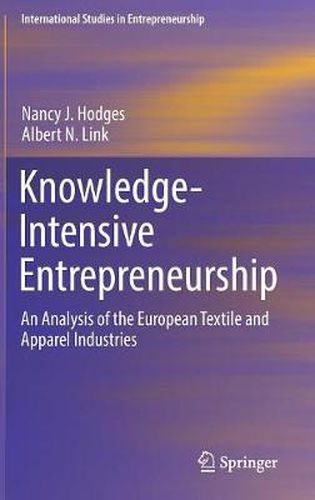Readings Newsletter
Become a Readings Member to make your shopping experience even easier.
Sign in or sign up for free!
You’re not far away from qualifying for FREE standard shipping within Australia
You’ve qualified for FREE standard shipping within Australia
The cart is loading…






This title is printed to order. This book may have been self-published. If so, we cannot guarantee the quality of the content. In the main most books will have gone through the editing process however some may not. We therefore suggest that you be aware of this before ordering this book. If in doubt check either the author or publisher’s details as we are unable to accept any returns unless they are faulty. Please contact us if you have any questions.
This book examines knowledge-intensive entrepreneurship (KIE) with a focus on the European textile and apparel industries. The primary purpose is to review the extant academic literature related to the European textile and apparel industries and reflect on that review empirically using a new and robust database on KIE to discover patterns between human capital and strategic entrepreneurial and innovative behavior.
According to the Advancing Knowledge-Intensive Entrepreneurship and Innovation for Economic Growth and Social Well-being in Europe (AEGIS) project, KIE is defined as an interface between knowledge generation and diffusion and the productive system. Knowledge-intensive entrepreneurs are thus involved in mechanisms that translate knowledge into innovation, which in turn leads to economic development and growth within an industry and/or region. To date, KIE is often associated with high-tech industries such as aerospace, computer engineering, automotive or telecommunications. For this reason, few studies have been conducted that specifically examine KIE as an avenue for firm or sector growth in the textile and apparel industries. However, new studies have positioned these industries as ones in which KIE can foster growth through innovation, and where products and processes are often evaluated within a knowledge-based framework. Building on this growing literature base, this volume explores potential policies and strategies for driving innovation and growth at the firm and industry levels in Europe and other regions, including the United States.
$9.00 standard shipping within Australia
FREE standard shipping within Australia for orders over $100.00
Express & International shipping calculated at checkout
This title is printed to order. This book may have been self-published. If so, we cannot guarantee the quality of the content. In the main most books will have gone through the editing process however some may not. We therefore suggest that you be aware of this before ordering this book. If in doubt check either the author or publisher’s details as we are unable to accept any returns unless they are faulty. Please contact us if you have any questions.
This book examines knowledge-intensive entrepreneurship (KIE) with a focus on the European textile and apparel industries. The primary purpose is to review the extant academic literature related to the European textile and apparel industries and reflect on that review empirically using a new and robust database on KIE to discover patterns between human capital and strategic entrepreneurial and innovative behavior.
According to the Advancing Knowledge-Intensive Entrepreneurship and Innovation for Economic Growth and Social Well-being in Europe (AEGIS) project, KIE is defined as an interface between knowledge generation and diffusion and the productive system. Knowledge-intensive entrepreneurs are thus involved in mechanisms that translate knowledge into innovation, which in turn leads to economic development and growth within an industry and/or region. To date, KIE is often associated with high-tech industries such as aerospace, computer engineering, automotive or telecommunications. For this reason, few studies have been conducted that specifically examine KIE as an avenue for firm or sector growth in the textile and apparel industries. However, new studies have positioned these industries as ones in which KIE can foster growth through innovation, and where products and processes are often evaluated within a knowledge-based framework. Building on this growing literature base, this volume explores potential policies and strategies for driving innovation and growth at the firm and industry levels in Europe and other regions, including the United States.